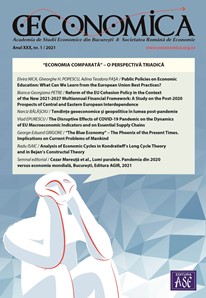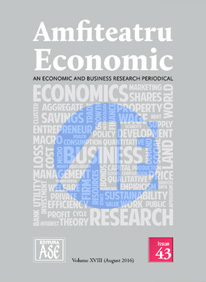
Recent Developments in the Economic Governance of the European Union Economy Near Us (VII)
The existence of Economic and Monetary Union creates a rather eccentric approach of the monetary and fiscal policy. While the European Central Bank’s monetary policy targets price stability union-wide, the fiscal policies have a national character and may have pro-cyclical effects. The large imbalance between the monetary and fiscal policies is a source of vulnerability towards achieving the European Union’s objectives.
The necessity for a central fiscal policy at the European Union level
The EMU Member States are “exposed to large idiosyncratic – economic or financial – shocks, especially where public debt levels are already high and governments have little room to respond with fiscal policy moves. To make matters worse, euro area banks own large amounts of domestic sovereign or government debt, opening the door to a vicious cycle in which sovereign and financial distress reinforce each other”.
The current mechanism of harmonising national fiscal policies proved to be unsatisfactory due to its potential pro-cyclical character, inefficient penalties system, its incentive and enforcement problems (with noted cases of moral hazard) undermining the confidence of economic agents in the fiscal legislation and in macroeconomic stability. Therefore, the continuation of the project leads us to the conclusion that the centralisation of fiscal decisions at the European level seems to be the best approach.
Moreover, in supporting the idea of a central fiscal policy at the European[1] level, Helge Berger, Giovanni Dell’Ariccia, and Maurice Obstfeld[2] argue that the Economic and Monetary Union’s Member States are “exposed to large idiosyncratic – economic or financial – shocks, especially where public debt levels are already high and governments have little room to respond with fiscal policy moves. To make matters worse, euro area banks own large amounts of domestic sovereign or government debt, opening the door to a vicious cycle in which sovereign and financial distress reinforce each other”.
Having a centralised fiscal policy at the European level offers the member states, the advantages of:
- Risk-sharing mechanism;
- Accelerating convergence among Member States of the Eurozone;
- Reducing the level of negative externalities deriving from domestic fiscal policy actions;
- Increasing the credibility of the European Union;
- Increasing fiscal predictability at EU level;
- Deepening the integration of the European Union;
- Economic strengthening of the European Union, with institutions capable of ensuring efficient management of the Union and stronger control mechanisms;
- Economic growth, according to EU objectives.
However, the opponents of a centralised fiscal policy have a number of arguments such as:
- Increasing the democratic distance between the decision-maker and the voter – moving the fiscal policy decisions from the level of the national governments at the level of the European Union determines a greater distance between the voter and the decision-maker;
- The possibility of increasing the EU budget – the existence of a central fiscal policy with a European Union budget that may intervene directly in the areas of necessity may lead to additional expenses for Member States;
- Reducing the independence of Member States in establishing individual public policies;
- Affecting the Member States' economic policies;
The Meseberg Agreement
According to Chancellor Merkel’s statements, the Eurozone’s budget is expected to be in place starting in 2021, and it will be managed by the European Commission. Its revenues will derive from the same sources as the Multi-annual Financial Framework.
Recently, on June 19th 2018, in Meseberg, the German Chancellor, Angela Merkel, and the French President, Emmanuel Macron, signed a joint declaration. The common statement has the potential to be the starting point of a crucial reform of European Union’s economic governance. One of its most important points is the announcement concerning the creation of the Eurozone’s budget.
Benoît Cœuré, Member of the Executive Board of the European Central Bank, underlines the role of a common budget for Eurozone[3]:
“The budget is also a political symbol for the shared interest of euro area countries. The euro area should be about more than individual interests in a currency managed by the ECB”.
According to Chancellor Merkel’s statements, the Eurozone’s budget is expected to be in place starting in 2021, and it will be managed by the European Commission. Its revenues will derive from the same sources as the Multi-annual Financial Framework. The Eurozone’s budget may be used to support those Member States of the Eurozone that have been affected most severely by the crisis, for example, by creating a support fund for the unemployed.
Guntram Wolff[4] thinks the budget for the euro zone is for convergence and investment, not stabilisation, possibly with a credit line for unemployment insurance. Nonetheless, what Wolff considers most interesting here, is the fact that it might get funding from three sources: the EU, Member States and its own tax. Decision-making is also interesting, combining strategic decisions by Eurozone Member States with decisions on expenditure by the European Commission”[5].
There is a dilemma at the level of the European Union regarding the road to be followed by European construction - federalism vs. inter-governmentalism.
The most recent European Council meeting was the next milestone for the Meseberg proposal. However, despite the high expectations that had built up before the June European Council meeting of EU leaders on 28-29 June 2018, the results of the Euro Summit were unsatisfactory. The leaders agreed on strengthening the European Stability Mechanism which “will provide the common backstop to the Single Resolution Fund”. The Euro Summit statement referred to national contributions, including the Franco-German (Meseberg) one, but not to the issue of a Eurozone budget, which was not discussed. Decisions were postponed until the Euro Summit in December 2018[6].
Nevertheless, the European Parliament's President, Antonio Tajani, welcomed “the proposals on an enhanced fiscal capacity for the Union, a European Finance Minister and the conversion of the ESM into a European Monetary Fund, provided the Community method is employed to carry out these reforms”[7].
Conclusions
Having a look at the past fiscal and monetary policy of European Union and at the more recent evolution, we may draw the following conclusions:
- There is a dilemma at the level of the European Union regarding the road to be followed by European construction - federalism vs. inter-governmentalism. From an economic point of view, arguments are in favour of federalism, but from a political point of view the idea does not have too many supporters. It is likely that compromise solutions such as harmonisation of fiscal policies in the field will continue to dominate European construction. However, the Meseberg agreement seems to send the signal that the time for real changes in the European economic governance is now;
- Introducing a central fiscal policy among the Economic and Monetary Union is the better solution in order to achieve European Union’s objectives;
- A central fiscal policy at the European level will contribute to the deepening and strengthening of the Economic and Monetary Union;
- The most recent evolution indicates that the two most powerful Member States of the Eurozone are committed to making important steps toward a central fiscal policy by proposing to create a common budget for the Eurozone (the Meseberg Agreement). Implementing the agenda of the Meseberg Agreement will contribute to:
- Deepening and strengthening the Economic and Monetary Union;
- Enhancing fiscal discipline;
- Creating a better support for monetary policy;
- Enhancing the ability of Eurozone to create an effective risk-sharing mechanism.
The two most powerful Member States of the Eurozone are committed to making important steps toward a central fiscal policy by proposing to create a common budget for the Eurozone.
Despite the fact that the idea of a common budget for the Eurozone is finally on the European agenda, the steps made toward a central fiscal policy are small and the idea of the central fiscal policy has strong opponents. Nevertheless, the Meseberg Agreement proves the two biggest euro area countries have agreed to a significant change in the future of Economic Monetary Union and are committed to implementing it.
In my opinion, convergence, stabilisation and the improvement of competitiveness of European Union Member States cannot be achieved in the absence of a common fiscal policy at the European Union level.
However, I consider that the idea of a common budget should not be limited to the Eurozone and should be extended to the European Union level. Otherwise, the existence of a common budget only for the Eurozone may negatively affect the convergence process and even the spirit of the European Union.
[1] The term of “European” refers to Euro zone.
[2] Helge Berger, Giovanni Dell’Ariccia, and Maurice Obstfeld, The Euro Area Needs a Fiscal Union, February 21, 2018, https://blogs.imf.org/2018/02/21/the-euro-area-needs-a-fiscal-union/.
[3]Interview with Benoît Cœuré, Member of the Executive Board of the ECB, conducted by Fabrice Nodé-Langlois and published on 25 June 2018, Le Figaro. https://www.ecb.europa.eu/press/inter/date/2018/html/ecb.in180625.en.html
[4] Guntram Wolff is the Director of Bruegel. His research focuses on the European economy and governance, on fiscal and monetary policy and global finance. He regularly testifies at the European Finance Ministers' ECOFIN meeting, the European Parliament, the German Parliament (Bundestag) and the French Parliament (Assemblée Nationale). From 2012-16, he was a member of the French prime minister's Conseil d'Analyse Economique.
[5] Silvia Merler. The Meseberg declaration and euro-zone reform, June 25th 2018, http://bruegel.org/2018/06/the-meseberg-declaration-and-euro-zone-reform/.
[6] Post-European Council Briefing, Outcome of the meetings of EU leaders on 28-29 June 2018,
http://www.europarl.europa.eu/RegData/etudes/BRIE/2018/621838/EPRS_BRI(2018)621838_EN.pdf
[7] Speech by the President of the European Parliament to the European Council meeting on 28 June 2018, http://www.europarl.europa.eu/the-president/en/newsroom/speech-by-the-president-of-the-european-parliament-to-the-european-council-meeting-on-28-june-2018








